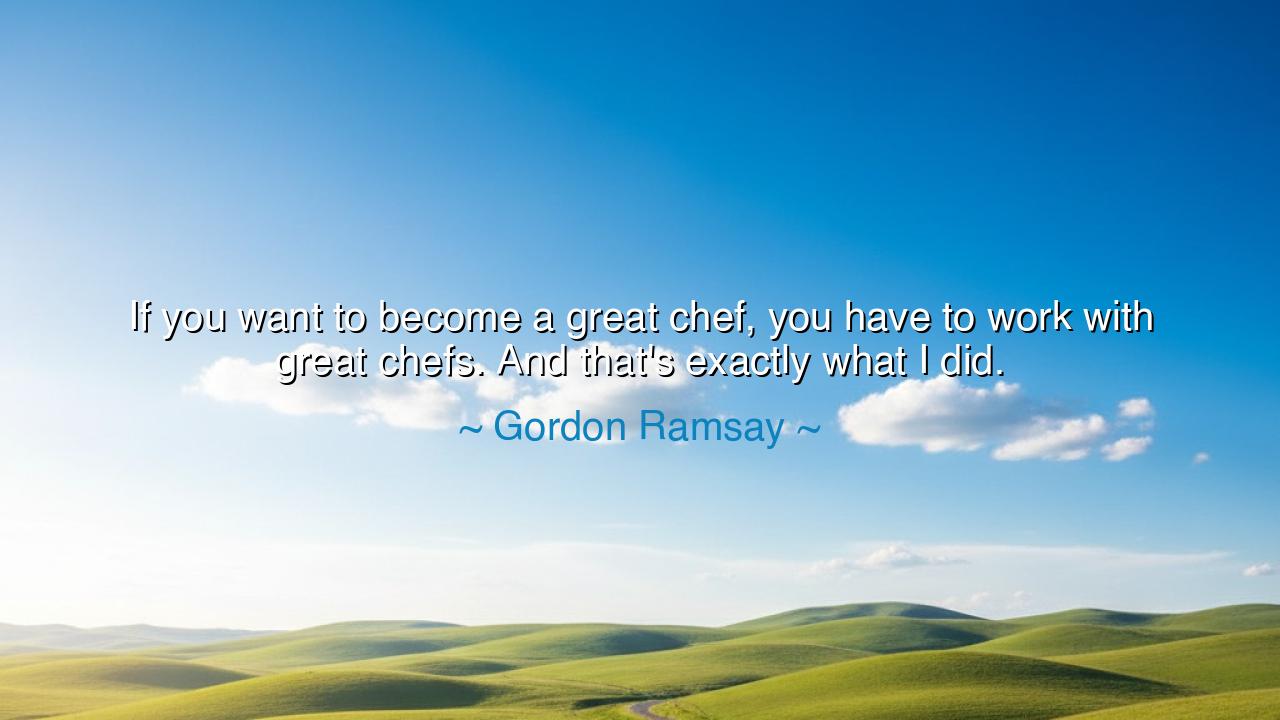
If you want to become a great chef, you have to work with great
If you want to become a great chef, you have to work with great chefs. And that's exactly what I did.






The words of Gordon Ramsay — “If you want to become a great chef, you have to work with great chefs. And that's exactly what I did” — are not merely about cooking. They are a declaration of humility before mastery, of understanding that greatness is not born in solitude, but forged in the fire of apprenticeship. In these words lies an eternal truth, known to the ancients and forgotten by the proud: that the path to excellence runs through the hands, hearts, and examples of those who came before us.
Every craft, whether the shaping of bronze or the seasoning of a dish, begins with imitation. Before a man can create, he must first learn to observe — to watch how the masters move, how they breathe, how they transform the ordinary into the sublime. Ramsay’s wisdom recalls the way of the ancient artisans, who would spend years as apprentices sweeping floors, sharpening tools, and studying in silence, long before they dared to call themselves masters. To work with great chefs is to submit oneself to discipline, to absorb their vision, to feel the rhythm of their excellence until it becomes one’s own heartbeat.
This truth is echoed in the story of Leonardo da Vinci, who began his journey not as a painter of genius, but as an apprentice in the workshop of Verrocchio. There, he mixed paints, cleaned brushes, and observed the strokes of a master. Yet it was within that humble labor that his gift awakened. Leonardo did not seek to outshine his teacher; he sought to understand him. In time, the pupil surpassed the master — but only because he first had the wisdom to serve. And so it was with Ramsay, who trained under legends such as Marco Pierre White and Guy Savoy, surrendering his ego to the discipline of learning until his own flame burned with the same intensity.
To learn from greatness is not an act of imitation but of transformation. When one stands beside a master, their energy becomes contagious. Their standards become your own; their obsession for detail reshapes the mind. Ramsay’s words remind us that excellence is not found in shortcuts or talent alone, but in the refining fire of mentorship. Greatness, like gold, is purified through pressure, correction, and the humility to begin again each day with the heart of a student.
Yet there is another layer to this teaching — the courage to seek the right teachers. Many wander through life surrounded by mediocrity, and so they become mediocre. But those who have the strength to seek out greatness — to stand among those who challenge them, who expose their weaknesses — those are the ones who rise. Ramsay’s choice to place himself among the best was not merely ambition; it was wisdom born of hunger, a hunger for mastery that could not be satisfied by comfort or praise.
Consider also the warrior schools of ancient Japan, where young samurai would leave their homes to train under sword masters far more severe than themselves. There, under the discipline of others, they learned not only technique but spirit — the art of control, patience, and respect. And when they returned, they carried within them not just skill, but the lineage of every master who had ever taught them. In this way, to work with greatness is to inherit eternity — to become a living continuation of all those who once strived for perfection.
The lesson, then, is timeless: If you wish to be great, humble yourself before greatness. Seek mentors who challenge, not flatter you. Surround yourself with those whose fire burns hotter than your own, and let their brilliance ignite your potential. Do not fear being the least skilled in the room; fear only the rooms where no one inspires you to grow.
For mastery is not a destination, but a lineage — passed from hand to hand, heart to heart, generation to generation. As Ramsay himself learned, the greatest honor of all is not to be called “great,” but to one day pass that fire to another, and see in their eyes the same hunger that once lived in your own. Thus the circle of mastery endures, and the art — whether of cooking, painting, or living — is never lost.






AAdministratorAdministrator
Welcome, honored guests. Please leave a comment, we will respond soon